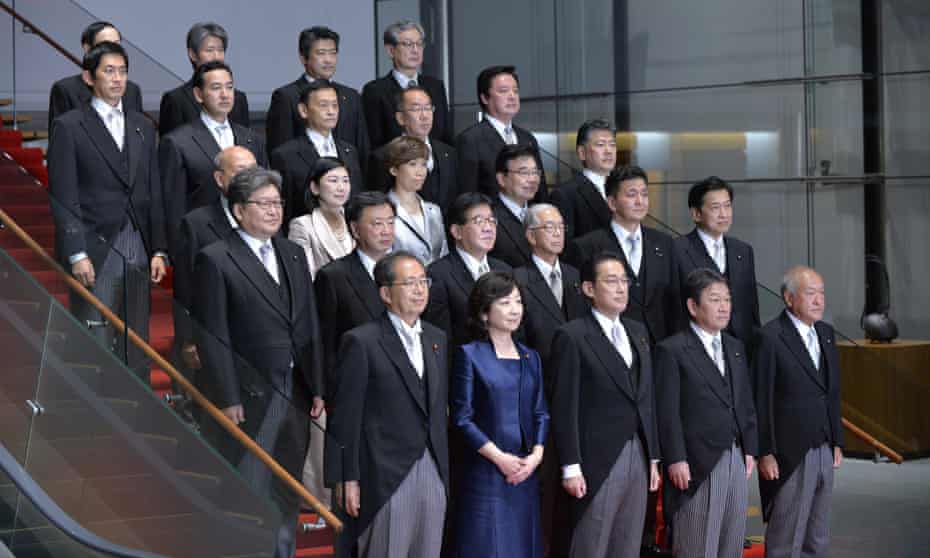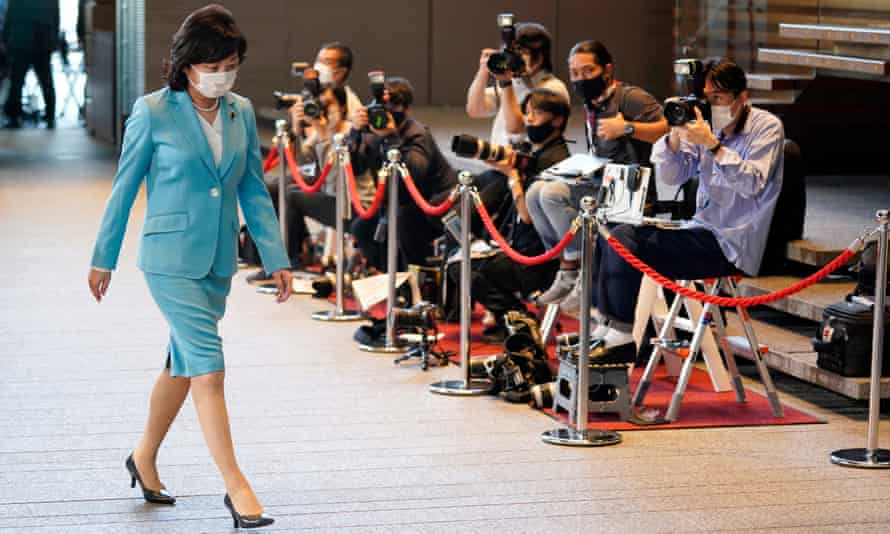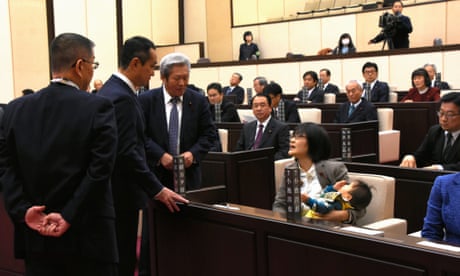Japan and women in politics
It is bullying, pure and simple’: being a woman in Japanese politics
Harassment is common for women who run for office and female MPs comprise just 9.9% of lower house

Mari Yasuda has come to dread checking her social media accounts. While a TV programme has tipped the candidate as “one to watch” in Japan’s general election this month, her anonymous correspondents make no secret of their belief that, as a woman, she should not be standing for parliament at all.
“They accuse me of sleeping with powerful men to get ahead or make abusive comments in calls to our office,” says Yasuda, who is contesting a seat in Hyogo prefecture for the opposition Constitutional Democratic party of Japan. “I receive emails from men remarking on my appearance or asking me for a date.”
Sexual harassment is becoming a fact of life for women who run for office in Japan, where female participation in politics is already among the lowest in the world. Despite the recent emergence of diversity and gender as topics of public debate – and signs that voters are more progressive than many of their representatives – the country’s politics have been immune to change, according to Yasuda.
“There are lots of areas of Japanese life in which women are underrepresented and feel unable to express themselves, but it’s particularly prevalent in politics,” she says.
Despite repeated vows by the previous prime minister, Shinzo Abe, during his nine years in office to create a society “in which women shine”, the 31 October lower house election will add to fears that, in the political sphere, the glass ceiling has only been reinforced.
While the governing Liberal Democratic party (LDP) is widely expected to win – albeit with a reduced majority – the powerful chamber will again be dominated by men.
Of the 1,051 candidates, just 186 – or less than 18% – are women, despite the introduction in 2018 of a gender equality law encouraging parties to select similar numbers of male and female candidates. That is slightly fewer than at the previous election in 2017.
“It is almost as if men become MPs by birthright,” says Yasuda, who once campaigned alone but is now accompanied by two colleagues. “If ordinary people felt politics was more relevant to their daily lives, then it would be natural for more women to get elected. But most people feel distant from politicians, as if politics is something for ‘special’ people … in Japan’s case, middle-aged and older men.”
Yoshiko Maeda, a councillor in western Tokyo since 2015, says sexism is not confined to social media. As a member of Japan’s Alliance of Feminist Representatives, Maeda says she has received reports from female politicians across Japan who experience harassment from male colleagues, ranging from heckling during debates to sustained pressure on them to resign. “It is bullying, pure and simple,” she says.
Local councils with just one or a handful of female representatives can be particularly intimidating, says Maeda, who received a stream of online abuse when the alliance called for the removal of a “sexualised” virtual mascot that had been enlisted to promote bicycle safety among schoolchildren in a town near Tokyo.
The atmosphere in council chambers, and well-documented accounts of sexual harassment targeting female politicians and candidates almost certainly puts other women off running for office, she says, although she is quick to point out that she has not encountered gender-based insults in the town she represents.
“Even those who want to get involved in politics often abandon the idea because of opposition from members of their family. There are still so many obstacles to women becoming politicians.”
Earlier this year, the cabinet office revealed that female politicians and candidates encounter “rampant” sexual harassment, including inappropriate touching and verbal advances by male voters. Of the 1,247 female local assembly members surveyed, 57.6% said they had been sexually harassed by voters, supporters or other assembly members. Many said they had been targeted with sexually explicit language or gender-based insults.
Harassment aside, the low number of female candidates running in this month’s election is proof that Japan has failed to address structural impediments to getting more women elected to parliament, according to Mari Miura, a professor of political science at Sophia University in Tokyo.
“Incumbent MPs are at a huge advantage in Japanese elections, so as long as the LDP remains by far the biggest party there will be very little change in the makeup of MPs,” Miura says. “That only happens when an opposition party wins.”

The LDP, which is fielding 33 women among 336 candidates in the 31 October election, has not lost a lower house election since 2009 and has governed almost uninterrupted since the 1950s. The result is a chamber packed with men, many of whom, including the current prime minister, Fumio Kishida, are second- or third-generation politicians.
“If an incumbent puts their hand up, they can get priority to become a candidate in the next election,” Seiko Noda, the minister for gender equality, said recently. “Current posts are overwhelmingly filled by men, and the party didn’t go as far as pushing them away to make way for women.”
Japan fairs poorly in international comparisons of female representation, ranking 165th out of 190 countries, with women comprising just 9.9% of lower house MPs, according to the Inter-Parliamentary Union. The picture is no different in local politics: just over 30% of town and village assemblies have no female representatives, according to 2019 figures.
“In many cases the only way women can win the endorsement of a major party is to go over the heads of the prefectural parties that are in charge of the selection process and use personal networks to appeal to powerful men in the party,” Miura says. “Japan should introduce quotas for female candidates and remove the structural barriers to standing for office. Unless it does that, I can’t see any prospects for change in the near future.”
Kishida, who has promised to redistribute wealth to Japan’s struggling middle class, appointed just three women to his 20-member cabinet and opposes calls to allow married couples to use separate surnames and to legalise same-sex marriages.
“Japanese society is changing,” Miura says, citing growing awareness among younger people of issues such as the climate emergency and gender inequality. “But Japanese politics has stayed exactly the same.”


Comentarios
Publicar un comentario